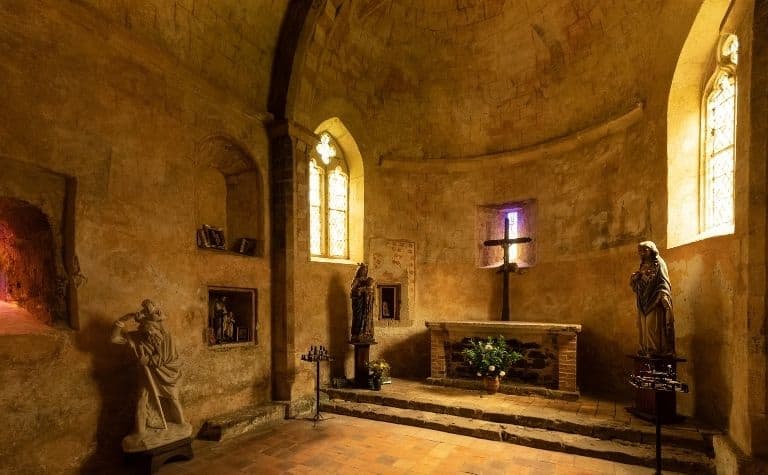Catholicism is one of the largest and oldest belief systems in the world. Over one billion people worldwide call themselves Catholics, follow the church’s teachings, participate in their practices, and adhere to their values. Many people want to know how the Catholic church is classified: is it a religion or a denomination?
Most people consider Catholicism a “religion,” especially when compared to non-Christian faiths. The term “denomination” is commonly used to describe traditions in the Protestant branch of Christianity. In certain settings, such as ecumenical contexts, some people refer to Catholicism as a denomination.
What’s the difference between a religion and a denomination? Why do some people consider Catholicism a religion? Why do some people consider Catholicism a denomination? What role does theology play in calling Catholicism a religion or a denomination? Keep reading to learn more.

What’s the Difference Between a Religion and a Denomination?
The terms “religion” and “denomination” both describe a group of like-minded people who adhere to a particular set of doctrines and practices. The terms aren’t unique to Christianity but are also found in other faith traditions.
- The term “religion” often describes a set of beliefs that are distinct from other faith traditions; generally, religions are often larger and older than denominations, but this isn’t always the case
- The term “denomination” often describes subgroups within a religion with unique convictions on non-essential matters of the faith; denominations within the same faith tradition often agree on primary doctrines and practices (Also see What’s the Difference Between a Denomination and a Sect?)
The reason some people refer to Catholicism as religion and others as a denomination can be subjective. Some people use one term or the other based on worldview presuppositions. (See the section below about how theology can determine how a person thinks of Catholicism.) Because this is the case, it’s important to know the basic definition of each term before proceeding:
- Religion: “A set of beliefs concerning the cause, nature, and purpose of the universe, especially when considered as the creation of a superhuman agency or agencies, usually involving devotional and ritual observances, and often containing a moral code governing the conduct of human affairs.” (dictionary.com)
- Denomination: “A religious group, usually including many local churches, often larger than a sect.” (dictionary.com)
Also, see Catholic vs. Non-Denominational: What’s the Difference?

Why Do Some People Consider Catholicism a Religion?
Some people consider Catholicism a religion because of (1) its size, (2) its beliefs, and (3) its history.
Its size: in common use, terms like “denomination” and “sect” describe smaller groups of people who subscribe to the same belief system. The term “religion” often refers to the largest belief systems in the world, like Judaism, Islam, Buddhism, Hinduism, and Christianity. Though Catholicism is a historic branch of the Christian faith, some people refer to it as a religion because of its size.
Its beliefs: though religions have different origins and are different in size, the primary distinction between them is their beliefs about God (or gods), the universe, history, the future, and people. Catholicism is unlike Islam and Buddhism, for example. Therefore, it’s considered one “religion,” while other faiths are considered a different religion.
Belief systems that share the same primary convictions but different secondary ones are commonly referred to as different denominations, not different religions. (Also see Does the Catholic Church Recognize Baptisms from Other Denominations?)
For example, Christians believe in the Trinity, and Muslims don’t. This is, in part, what makes them different world religions. Baptists and Presbyterians both believe in the Trinity. However, they disagree about who should be baptized (children or adults?) and how (immersion or sprinkling?). This is, in part, what makes them different Christian denominations.
Its history: Belief systems, commonly called a “religion,” are often older than other faith traditions. A belief system that is less than 100 years old, for example, isn’t often called a “religion” but more commonly a “denomination,” a “sect,” or even a “cult.” In contrast, Christianity is approximately 2,000 years old, Islam is 1,400 years old, and Judaism is 4,000 years old. Each is considered a religion.
Also, see What Are the Different Catholic Denominations?
Why Do Some People Consider Catholicism a Denomination?
Some people consider Catholicism a denomination when they want to draw attention to the idea that the belief system is a historic branch of the Christian faith like the Protestant and Eastern Orthodox traditions are.
The intention is often to foster a sense of unity among various Christian traditions. Other people believe this intention encourages false unity because it doesn’t take seriously the different convictions of each group.
- The general meaning of ecumenical is universal.
- The meaning of ecumenical as an adjective is something that relates to the historic faith of Christianity.
- The meaning of ecumenical as an ambition is promoting or fostering Christian unity throughout the world.
- The meaning of ecumenical as a historical movement refers to efforts by certain Protestant groups since the 1800s aimed at achieving universal Christian unity and church union through international interdenominational organizations that cooperate on matters of mutual concern. [3]
Though referring to Catholicism as a denomination is common in ecumenical contexts, it isn’t exclusive to them. For example, Baptist, Methodist, and Presbyterian church members may share the spirit of the ecumenical movement in their view of the Catholic church, even if they aren’t directly involved in the movement itself. (Also see Evangelical vs. Non-Denominational: What’s the Difference?)

What Role Does Theology Play In Calling Catholicism a Religion or Denomination?
Some who want to emphasize the theological commonalities between Catholicism and other Christian traditions (e.g., the Trinity) refer to it as a denomination. Others who want to emphasize the difference between Catholicism and other Christian traditions (e.g., purgatory) refer to it as a religion.
- When someone calls Catholicism a denomination, the implication is that it’s one group within the Christian faith. It’s so similar it shouldn’t be considered a separate religion from Protestant denominations.
- When someone calls Catholicism a religion, the implication is that it’s so different. It should be considered as equal to Protestant denominations, for example.
In the last 500 years, Catholics and Protestants have had many significant theological agreements, which makes this distinction critically important to some. In the last half-century, the relationship between Catholics and Protestants has improved for a variety of reasons, such as the statements of unity made at Vatican II (1962-1965).
About Vatican II, one writer states, “With many of these changes resonating with the perspectives of other Christian denominations who sent observers to the Second Vatican Council, it was an ecumenical ‘milestone for Catholics, Protestants, the Orthodox.’ These changes, while praised by many faithful Catholics, remain divisive among those identifying as traditionalist Catholics.” [4]
Also, see What Version of the Bible Do Different Denominations Use?
References:
[1] Source
[2] Source
[3] Source
[4] Source
Related Questions
Wondering What Denominations Are Calvinist? Here’s the Answer
The teachings of French pastor and theologian John Calvin (1509-1564) have been a significant part of the Protestant branch of the Christian faith for over 500 years. At the beginning of the 21st...
Arminianism, which is often contrasted with Calvinism, has been an influential theological belief system in Protestant Christianity for 500 years, though some aspects of it are much older. Just like...
